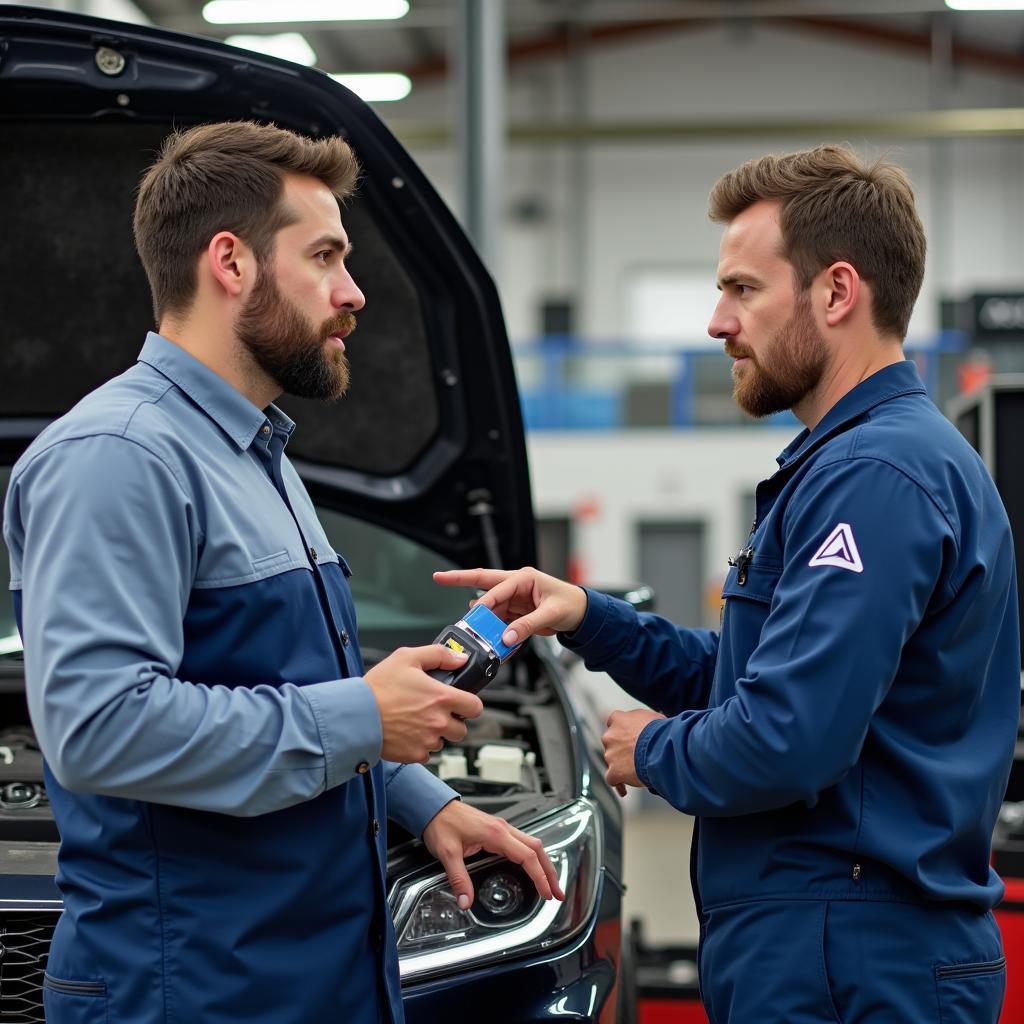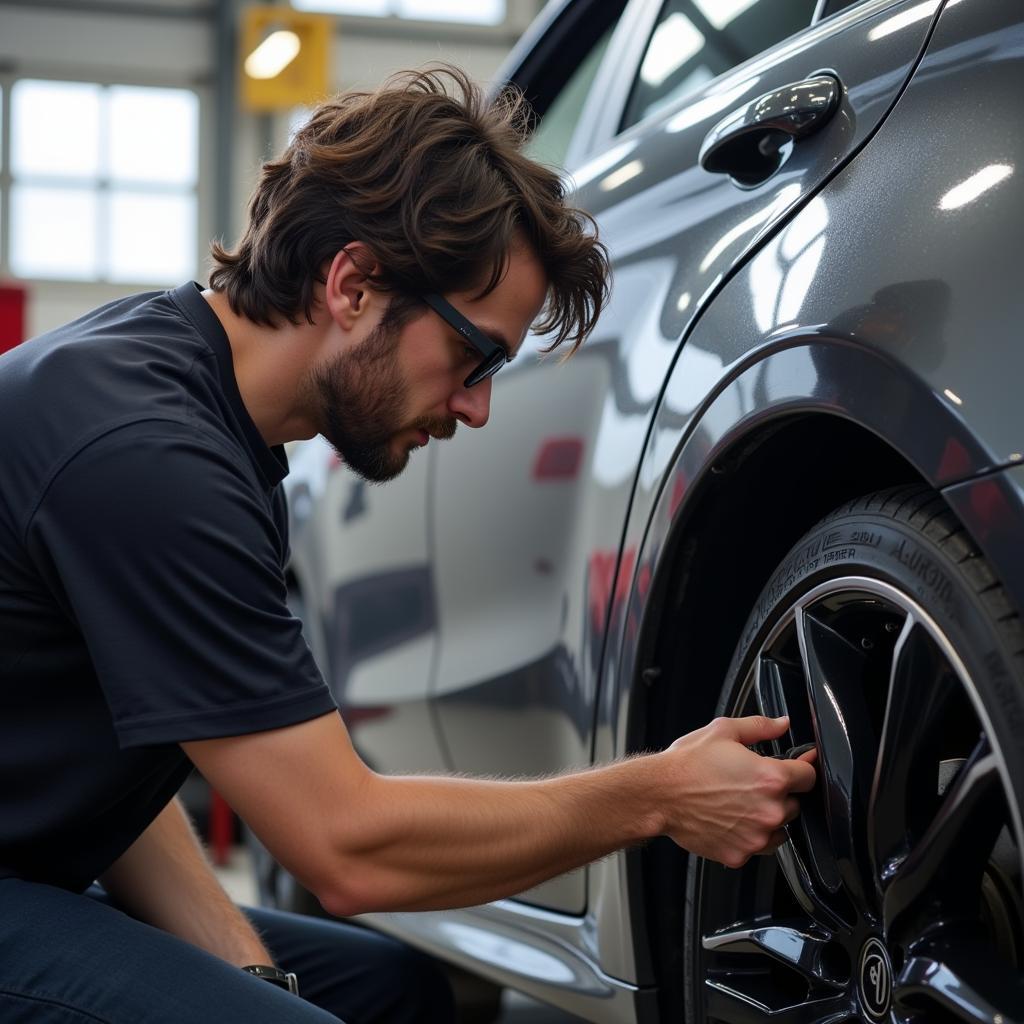Knowing How To Assess Car Repairs can save you money and ensure your vehicle is fixed correctly. Whether you’re dealing with a minor scratch or a major engine overhaul, understanding the repair process is crucial. It empowers you to make informed decisions and avoid unnecessary expenses. This article provides a comprehensive guide on evaluating car repairs effectively.
Getting your car repaired can be a daunting experience. Many drivers aren’t mechanically inclined and feel vulnerable when dealing with auto repair shops. Do you know how to assess car repairs? How can you tell if the work is necessary and the price is fair? Learning to assess car repairs effectively equips you with the knowledge to confidently navigate this process. You’ll gain insights into identifying necessary repairs, understanding cost estimates, and ensuring quality workmanship. Don’t get taken for a ride – learn how to assess car repairs yourself. Check out our guide on how to repair a dent in a car and paint for more tips on DIY repairs.
Understanding the Repair Estimate
Before any work begins, get a detailed written estimate. This document should outline all the necessary repairs, including parts and labor costs. A clear estimate is the foundation of how to assess car repairs properly.
Scrutinizing the Estimate Details
Carefully review the estimate. Look for specific part names, numbers, and prices. Compare these prices with online retailers or other repair shops to ensure you’re getting a fair deal. Question anything that seems unclear or overpriced. Is the labor rate reasonable? Are there any additional fees? Don’t hesitate to ask for clarification. Transparency is key.
Knowing how much does it cost for scratches on car repair can be a good starting point for comparison when you receive estimates for similar damage.
Verifying the Diagnosis
A proper diagnosis is crucial for effective repairs. Ask the mechanic to explain the diagnostic process and why they believe specific repairs are necessary. A reputable mechanic will be happy to walk you through their findings. They should be able to show you the faulty parts and explain how they affect your vehicle’s performance.
Asking the Right Questions
Don’t be afraid to ask questions. A thorough understanding of the problem is essential when learning how to assess car repairs. Inquire about the symptoms, the diagnostic tests performed, and the logic behind the recommended repairs. If you’re still unsure, consider getting a second opinion from another mechanic.
 Mechanic explaining car damage to car owner
Mechanic explaining car damage to car owner
Inspecting the Repairs
Once the repairs are completed, thoroughly inspect the work. Make sure all the agreed-upon repairs have been performed, and the replaced parts are new and of good quality. If you’re unsure about anything, don’t hesitate to ask for further explanation. Knowing how to assess car repairs after they’re done is just as important as the initial assessment.
Checking for Quality Workmanship
Look for signs of quality workmanship. Are the new parts properly installed? Are all the bolts and screws tightened? Is the area clean and free of debris? A good mechanic takes pride in their work and will ensure the repairs are done correctly. Learn how to repair toy car to gain a basic understanding of mechanical repairs.
If you’re wondering, “Can I claim car insurance for repairs?” our dedicated guide provides a comprehensive overview of the process and what you need to know.
Documenting Everything
Keep all documentation related to the repairs, including the estimate, invoices, and warranty information. This documentation can be invaluable if any issues arise later. It’s also helpful to take photos of the damaged areas before and after the repairs. This provides visual evidence of the work performed and can be useful for insurance purposes.
 Car owner inspecting completed car repairs
Car owner inspecting completed car repairs
Getting a Second Opinion
If you’re still unsure about the recommended repairs or the cost, don’t hesitate to get a second opinion from another reputable mechanic. A second opinion can provide valuable insights and help you make an informed decision. This is especially important for major repairs or if you suspect something is amiss.
You can learn about fixing minor damages yourself by checking our article on how to repair car windshield crack.
Conclusion
Learning how to assess car repairs empowers you to take control of your vehicle’s maintenance and avoid unnecessary expenses. By following these tips, you can confidently navigate the repair process and ensure your car is fixed correctly. Remember, a well-informed car owner is a empowered car owner.
FAQ
- What should I do if I disagree with the mechanic’s diagnosis?
- How can I find a reputable mechanic in my area?
- Is it always necessary to get a second opinion?
- What are some common car repair scams to watch out for?
- How can I negotiate the price of car repairs?
- What are my rights as a consumer when it comes to car repairs?
- What should I do if the repairs are not done correctly?
Need assistance? Contact us via WhatsApp: +1(641)206-8880, or Email: [email protected]. Our customer service team is available 24/7.

Leave a Reply